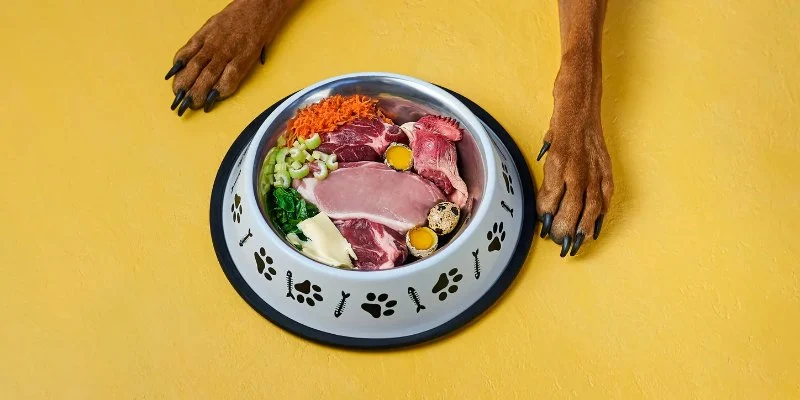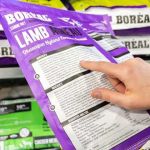
Importance of Fiber in Pet Diets: When & How Much
- 1. Why Fiber Is Important for Pets
- 2. Benefits of Fiber in Pet Diets
- 3. How Much Fiber Do Pets Need?
- 4. Types of Fiber Suitable for Pets
- 5. When to Add More Fiber to Your Pet’s Diet
- 6. How to Incorporate Fiber Into Your Pet’s Diet
- 7. How Pet & Puppy Can Help with Your Pet’s Nutrition
1. Why Fiber Is Important for Pets
Fiber is a crucial part of your pet’s diet, even though it is not considered a primary nutrient like protein, fats, or carbohydrates. Just like in humans, fiber plays an essential role in maintaining digestive health for pets. It helps regulate bowel movements, prevent constipation, and can support weight management by making your pet feel fuller for longer periods.
For pets, fiber serves as a form of bulk in the digestive system, which aids in pushing food through the intestines efficiently. It also provides a range of other benefits, such as enhancing the absorption of nutrients and promoting overall gastrointestinal health. Not all fiber is created equal, so it's important to ensure that the fiber in your pet's diet comes from high-quality, easily digestible sources.

VCA Swengel Animal Hospital
IndianapolisMarion CountyIndiana
6950 S East St, Indianapolis, IN 46227, USA
2. Benefits of Fiber in Pet Diets
Incorporating fiber into your pet’s diet offers numerous benefits, from digestive health to weight management. Below are some of the key benefits fiber provides for pets:

Follow Your Heart Animal Hospital
446 N Higley Rd UNIT 103, Mesa, AZ 85205, USA
1. Promotes Healthy Digestion
Fiber helps regulate your pet’s digestive system by adding bulk to stool and ensuring smooth movement through the intestines. This helps prevent constipation and promotes overall gut health. For pets with sensitive stomachs or prone to digestive issues, fiber is an essential nutrient that can support better digestion and comfort.
2. Supports Weight Management
Fiber-rich diets can help your pet feel full for longer periods, reducing overeating. By including more fiber in your pet's diet, you can help them maintain a healthy weight or manage obesity. This is particularly important for pets that are prone to weight gain, as fiber helps with appetite control without adding excessive calories.
3. Prevents Anal Gland Issues
Pets with low fiber intake may experience more problems with their anal glands, as the lack of bulk in the stool can lead to a buildup in the glands. Fiber helps ensure that the stool is firm enough to naturally express the anal glands during defecation, preventing discomfort or infections.
4. Enhances Nutrient Absorption
Fiber also plays a role in nutrient absorption. It can slow down the passage of food through the digestive tract, allowing for better absorption of vitamins and minerals. This is especially beneficial for pets with compromised digestion or those needing a more nutrient-dense diet.
3. How Much Fiber Do Pets Need?
Determining how much fiber your pet needs depends on several factors, such as their size, age, health status, and activity level. In general, the fiber content in a pet's diet should range from 2% to 5% for adult pets. However, some pets, such as those with gastrointestinal issues or obesity, may require higher amounts of fiber.
For dogs, a diet with 3% to 5% fiber content is typically adequate for maintaining digestive health. Cats, being obligate carnivores, usually require less fiber, around 1% to 2%. However, these recommendations can vary depending on your pet’s specific health needs, so consulting with your veterinarian is important to tailor the diet correctly.
4. Types of Fiber Suitable for Pets
Not all fibers are equal, and some are better suited for pets than others. Fiber comes in two primary types: soluble and insoluble. Both play important roles in your pet’s digestive health.
1. Soluble Fiber
Soluble fiber dissolves in water and forms a gel-like substance in the intestines. It helps regulate bowel movements, absorb water, and manage cholesterol levels. Common sources of soluble fiber include oats, peas, and carrots. This type of fiber is beneficial for pets with diarrhea or digestive issues.
2. Insoluble Fiber
Insoluble fiber does not dissolve in water, but instead, it adds bulk to stool, aiding in regular bowel movements. It helps prevent constipation and maintains gut health. Common sources of insoluble fiber include wheat bran, corn, and green beans. This fiber type is excellent for pets that are prone to constipation.
5. When to Add More Fiber to Your Pet’s Diet
There are certain signs that indicate your pet may need more fiber in their diet. These include:
- Chronic constipation or difficulty with bowel movements.
- Overweight or obesity, where fiber can help with weight management.
- Digestive issues like diarrhea or gas, where fiber helps balance the digestive system.
- Anal gland problems or excessive scooting, which can indicate insufficient fiber.
If you notice any of these issues, it may be time to increase fiber in your pet’s diet. However, it's always a good idea to consult with your vet before making dietary changes to ensure that fiber is added at the right amount and from appropriate sources.
6. How to Incorporate Fiber Into Your Pet’s Diet
There are several ways to increase fiber intake in your pet’s diet:
1. Choose High-Fiber Pet Food
Many premium pet food brands offer high-fiber formulas that are designed to support digestive health and weight management. Look for foods that list quality sources of fiber, such as pumpkin, sweet potatoes, and peas.
2. Add Fiber-Rich Supplements
If your pet’s food doesn’t contain enough fiber, consider adding fiber supplements to their meals. These supplements come in various forms, including powders, capsules, or treats, and are an easy way to boost fiber intake without drastically changing their diet.
3. Incorporate Fiber-Rich Human Foods
Pet-safe human foods like cooked sweet potatoes, pumpkin puree, or green beans can be added to your pet’s meals as a natural source of fiber. Always check with your vet to ensure these foods are suitable for your pet and won’t cause digestive upset.
7. How Pet & Puppy Can Help with Your Pet’s Nutrition
At Pet & Puppy, we understand how important proper nutrition is for your pet’s overall health. Our platform offers a wide range of pet food products, fiber supplements, and expert advice to ensure your furry friend is getting the best possible diet. Whether you’re looking to improve your pet's digestive health or manage their weight, we can guide you toward the best options to meet your pet’s nutritional needs.
Visit Pet & Puppy today to find fiber-rich products and expert resources to help you optimize your pet’s diet and well-being!







 Petco4.0 (862 reviews)
Petco4.0 (862 reviews) Country Critters Veterinary Hospital4.0 (123 reviews)
Country Critters Veterinary Hospital4.0 (123 reviews) Bright Veterinary Clinic: Clahoun Justin DVM4.0 (1 reviews)
Bright Veterinary Clinic: Clahoun Justin DVM4.0 (1 reviews) Rainforest Farms International2.0 (45 reviews)
Rainforest Farms International2.0 (45 reviews) Hurstbourne Animal Hospital4.0 (848 reviews)
Hurstbourne Animal Hospital4.0 (848 reviews) Aquarium Concepts4.0 (195 reviews)
Aquarium Concepts4.0 (195 reviews) How to Read the “Guaranteed Analysis” on Pet Food Labels
How to Read the “Guaranteed Analysis” on Pet Food Labels Transitioning Training Methods as Pet Ages: Adapting Techniques for Senior Pets
Transitioning Training Methods as Pet Ages: Adapting Techniques for Senior Pets How to Find the Right Specialist Vet (Cardio, Ortho, Neuro)
How to Find the Right Specialist Vet (Cardio, Ortho, Neuro) Panleukopenia (Distemper) in Cats: Prevention & Signs You Should Know
Panleukopenia (Distemper) in Cats: Prevention & Signs You Should Know Stopping Pet Digging Behavior: Yard & Indoor Tips
Stopping Pet Digging Behavior: Yard & Indoor Tips How to Re-Train a Rescue Dog with Unknown History: Tips and Techniques
How to Re-Train a Rescue Dog with Unknown History: Tips and Techniques